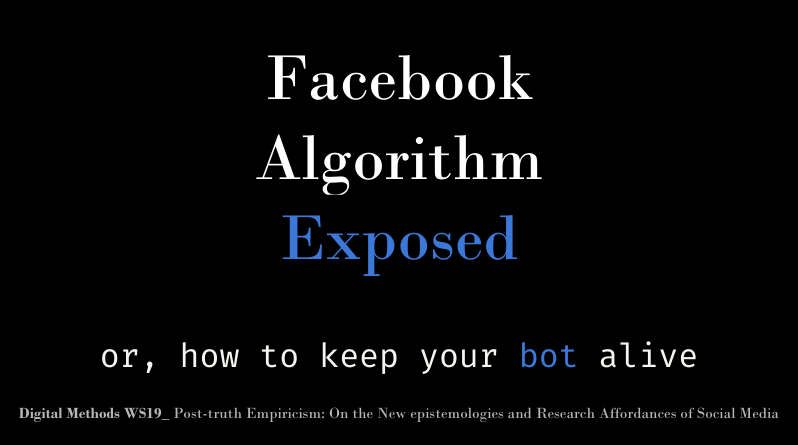Between the 7th and 11th of January, Claudio Agosti, Davide Beraldo and Jeroen de Vos from the ALEX / DATACTIVE team took part in the annual Digital Methods Initiative’s Winter School. This was the perfect occasion to kick-off a project related to the development and application of facebook.tracking.exposed, a browser extension developed in order to expose the functioning of the secretive Facebook’s News Feed algorithm and adopted by the Algorithms Exposed (ALEX) project.
The ALEX project pitch collected quite some interest, with about 15 people coming together for a hectic as much as a fun week of collaborative thinking, experimenting and analyzing. Given the many possibilities of exploring and the variety of available skills, the group split into 2 subgroups: one has been busy with the creation of brand new ‘bots’, with the experimental interest in assessing the role of emotional engagement and friendship making in the Facebook timeline algorithm; the second group has been working on an existing dataset related to last year’s Italian national elections.
You can take a deeper look at what has been done and the insights that have been collected in the Winter School’s project wiki (TBA) and in the final presentation. Here is a bullet-point summary of the main findings:
• a bot’s life is a dangerous life… you gotta be smart not to be Facebook-killed
• being a bot is not that boring though… many new bot friends are ready to connect to you
• love wins over hate… consistently love-reacting posts seems to trigger more content on the timeline than consistently “angry”/negative reactions
• tell me what you liked, I tell you what you’ll see… selectively liking posts from different political orientations will affect the political issues you will see on your future timeline
• and lastly, and this is controversial… centre-left wing bots are more prone to be exposed to controversial content than far-right wing bots.
Many thanks to the organizers of the Winter School and, of course, to all those who contributed to the Algorithms Exposed group: Iain Emsley, Fatma Yalgin, Hannah Vischer, Victor Pak, Claudio Agosti, Mathilde Simon, Victor Bouwmeester, Yao Chen, Sophia Melanson, Hanna Jemmer, Patrick Kapsch, Giovanni Rossetti, Davide Beraldo, Giulia Corona, Leonardo Sanna, Jeroen de Vos.
